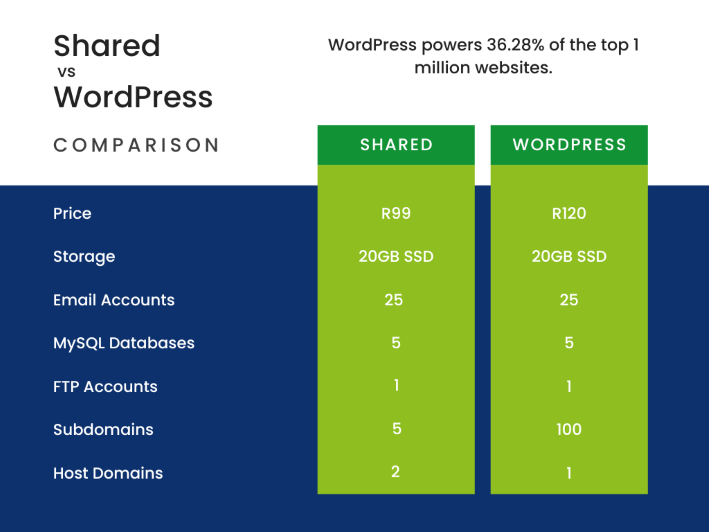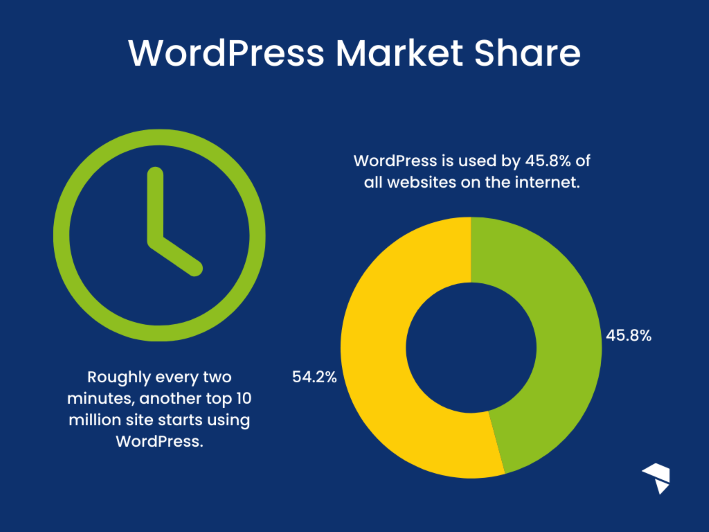

WordPress Hosting vs Web Hosting: Top Choice for 2024?
WordPress Hosting vs Web Hosting, which one is best? We’re going to break down their complexities and piece them back together in a way that’s easy to understand.
This guide will highlight what these services are, their key features, advantages and disadvantages, and how to choose the right one for you.
WordPress Hosting vs Shared Hosting: Main Features Compared
Before we dissect these complex creatures, it’s important to understand what they’re made of.
Imagine WordPress Hosting as a world-class athlete, trained for a specific sport. It’s primed to optimise your WordPress website’s speed, security, and uptime. It even employs a pit crew of WordPress-savvy professionals who manage the technical bits. This frees you up to focus on growing your site.
Shared Web Hosting, on the other hand, is more of a generalist, like a versatile all-rounder. It harbours multiple websites on a single server, all sharing the same resources. It’s an economical choice since the server’s costs are split among all the websites it hosts.

What Is Web Hosting?
If websites were houses, web hosting would be the land on which they are built.
Web hosting is a service that facilitates your website’s existence on the internet. It involves storing your site’s data on a server. A server is just a powerful computer that delivers your website to anyone who visits it online.
A few of the several types of web hosting are: shared, VPS, dedicated, and cloud hosting. In shared hosting, your website shares server space and resources with other websites.
VPS hosting is a step up. Imagine having a building where everybody has their own apartment and resources.
In dedicated hosting, you own the whole building.
Cloud hosting, on the other hand, spreads your site data across several servers, providing flexibility and scalability.
Take a more in-depth look into web hosting types, we dive headfirst into these waters in this blog.
The Advantages of Shared Web Hosting
Shared web hosting has a number of benefits, but let’s focus on the ones that shine the brightest.
Affordability
When you share the server resources with other tenants, you split the all costs evenly. That’s affordability at its finest, and that’s precisely the kind of hosting package shared web hosting offers.
Beginner friendly
Often, shared web hosting includes an intuitive control panel that makes managing your website as easy as (eating) pie. This means you don’t have to be a pro with years of experience to handle site management.
Professional support
Shared web hosting often comes with a skilled team of support specialists who handle server maintenance, updates, as well as general site functionality.
This integrative approach means you no longer have to wake up in cold sweat fearing a server crash. Issues like website malfunctions can be dealt with as soon as they rear their ugly head.
You can focus your time and energy on what truly matters: building your website.

The Disadvantages of Web Hosting
Despite its advantages, web hosting isn’t without its fair share of pirates in the bay. Let’s have a quick look at some of these possible drawbacks.
Shared server resources
In the shared web hosting world, shared servers aren’t always fun, especially when one starts hogging all the resources.
On a shared hosting server, it’s possible for resource-hungry websites to eat into your portion of server resources, which might impact your website’s performance.
Security
Another potential issue lies in the realm of security. If one website on the shared server encounters a security threat, all other sites (including yours) are at risk. Think of it as one sick person potentially infecting everyone in the same household.
Here at HOSTAFRICA, we do our utmost best to prevent any security issues before they become a threat. We isolate our shared hosting environments with CageFS, limiting any security issues to where the breach occurred.
Check out this blog post on why you should take web security seriously.
Limited scalability
Lastly, shared hosting might struggle with scalability. As your website grows and attracts more traffic, you might find that shared hosting can’t quite keep up with the increased demand.
So, while shared web hosting is a popular choice for beginners due to its affordability and user-friendliness, it’s important to keep these potential drawbacks in mind when making your decision.
What Is WordPress Hosting?
In the simplest of terms, WordPress Hosting is specialised hosting that’s been optimised to meet WordPress performance and security needs.
It’s a concierge service where all technical aspects of running WordPress are managed by the host. What does this mean for you? More time to focus on building an amazing site.
In the context of our housing metaphor, think of WordPress Hosting as a custom-built home for your WordPress site, tailored to meet your specific needs.
These hosting plans often come with WordPress-specific features. Depending on the hosting company, they can also include managed WordPress hosting plans. The features include one-click installations, automated updates, and advanced security measures specifically designed for WordPress.
Although, not all that glitters is gold. While WordPress Hosting plans typically might seem like the answer to all your prayers, it also has its challenges. Let’s go over the advantages and disadvantages, and you can make up your own mind from there.

The Advantages of WordPress Hosting
WordPress Hosting is like a tailor-made suit – it fits you in all the right places. Let’s explore why it’s such a hit with WordPress users.
Speedy site
The star of the show is high-speed performance. With servers specifically set up for WordPress, your site doesn’t just walk, it sprints! This increased speed can lead to not only happier visitors but also potentially to a higher search engine ranking.
Learn more on how to rank well in Google in this blog.
Sturdy security
Security is another gem in the WordPress Hosting treasure chest.
Since WordPress Hosting providers are well-acquainted with the ins and outs of WordPress, they can implement advanced security measures and are quick to respond to potential vulnerabilities.
Backups
Ever wished for an assistant to manage updates and backups for your site?
Automatic updates make managing a WordPress site a breeze. Plus, many WordPress hosts offer automated backups, giving you peace of mind that your data is safe and sound, like a pirate’s gold hidden on a desert island.
Support
Finally, nothing beats expert support that understands your WordPress website inside and out. With WordPress Hosting, you’ll have access to WordPress-proficient experts for help when you need some wind in your sails.
The Disadvantages of WordPress Hosting
It’d be shrewd of us to gloss over the potential hurdles on the WordPress hosting track, so let’s lend an ear to the grapevine.
Pricier
WordPress Hosting typically comes with a higher price tag than shared hosting.
Like a boutique hotel, it’s pricier than budget places because of the custom-tailored hosting environment and premium services. Basically, you get what you pay for.
Some restrictions
WordPress Hosting also tends to come with restrictions, particularly around the plugins you can use.
Some plugins might be disallowed due to security concerns or because they affect site performance. This can sometimes limit your flexibility when it comes to customising your site.
Single use
Lastly, and this is a bit of a no-brainer, WordPress hosting is, well, just for WordPress.
This is not a concern if you’re dedicated to using WordPress, but if you ever want to use another platform, this could become a hurdle.
It’s rather like buying a toaster that only toasts one specific type of bread. It’s great as long as you love that bread, but not so much if you decide you fancy a bagel instead.
Key Differences between Standard and WordPress Hosting
Alright then, now that we’ve dipped our toes into the intricacies of WordPress hosting and shared hosting, it’s time to pan back and see the bigger picture. So, what truly sets these two apart from each other?
Let’s start with usability. Shared hosting is your all-in-one, Swiss army knife kind of service. It can accommodate various types of websites built on different platforms.
On the contrary, WordPress hosting is exclusively designed to host WordPress sites and is custom-tuned to optimise their performance.
In terms of performance, WordPress hosting has a slight edge. It’s rather like driving a sports car designed for speed, while shared hosting is more of a reliable, all-rounder family sedan.
Maintenance wise, WordPress hosting takes the cake by a small margin, thanks to its automated updates and WordPress-specific support. Think of it as a self-cleaning oven compared to a conventional oven.
When we talk about costs, shared hosting is undoubtedly the more pocket-friendly option, making it attractive for those who are just starting with their online endeavours.
In contrast, WordPress hosting, with its wide array of specialised WordPress features, carries a premium price tag.
The bottom line? Different situations call for different solutions. These key differences between standard and WordPress hosting will help guide your decisions. Your specific needs, capabilities, and circumstances should dictate which option you go for.

Web Hosting vs WordPress Hosting – Choosing Between the Two
With all the information we’ve navigated through, you might be feeling a bit like you’re stuck between a rock and a hard place. But fear not! Helping you make this decision is what this guide is all about.
If you’re just starting your online journey or running a small business, shared web hosting could be a practical and cost-effective solution.
It gets the job done without burning a hole in your pocket. It’s also an excellent option if you anticipate using a platform besides WordPress or want to experiment with other CMSs.
On the other hand, if you’re dedicated to WordPress and want a performance-optimised site WordPress Hosting is a great option. You won’t have to worry about the technical nitty-gritty either.
These are some of the questions you can ask yourself to see where you land.
- Will I only use WordPress as my CMS?
- Am I good at general website maintenance?
- Am I good at securing my website?
- Am I limited by my budget?
- Do I know enough about WordPress?
Ultimately, the decision comes down to your specific needs and long-term plans. Consider what you want to achieve with your website and budget. Also think about your desire to get intimately acquainted with the technical side of things.
Conclusion
Together we’ve journeyed through the intriguing landscape of shared web hosting and WordPress hosting.
Shared hosting, with its cost efficiency and compatibility with various platforms, is like a friendly, versatile, all-rounder on your team.
WordPress hosting, on the other hand, is like hiring a high-performance, WordPress-dedicated pro ready to boost your site’s potential.
In essence, your choice depends on your specific needs, your set budget, and the nature of your website. Consider your website’s growth, the desired level of control, and security requisites before you take a step in either direction.
Remember, every website’s journey is as unique as a thumbprint, and so should your choice of web host be. Don’t hesitate to ask for assistance; our experts are always here to help you choose the best hosting environment depending on your preferences.


